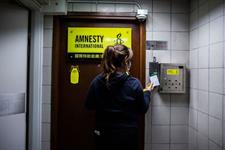Amnesty International will close two offices in Hong Kong by the end of 2021, after warning that a national security law is putting the charity’s employees at risk.
An office focused on human rights education in Hong Kong will cease operations at the end of October, while a regional office that forms part of the charity’s global International Secretariat will close by the end of this year.
The regional office’s research, advocacy and campaigning work in East and Southeast Asia and the Pacific will be moved to the charity’s other offices in the Asia-Pacific region. The decision will leave the charity without a presence in the city for the first time in 40 years.
Announcing the closures, Anjhula Mya Singh Bais, chair of Amnesty’s International Board, said: “This decision, made with a heavy heart, has been driven by Hong Kong’s national security law, which has made it effectively impossible for human rights organisations in Hong Kong to work freely and without fear of serious reprisals from the government.
“Hong Kong has long been an ideal regional base for international human rights organisations, but the recent targeting of local human rights and trade union groups signals an intensification of the authorities’ campaign to rid the city of all dissenting voices.
“It is increasingly difficult for us to keep operating in such an unstable environment.”
The national security law was enacted by the Chinese central government on 30 June last year.
It targets alleged acts of “secession”, “subversion of state power”, “terrorist activities” and “collusion with foreign or external forces to endanger national security”, according to Amnesty International.
The charity said in a statement that the law’s sweeping and vaguely-worded definition of “national security” had been used arbitrarily as a pretext to restrict the human rights to freedom of expression, peaceful assembly and association, as well as to repress dissent and political opposition.
Bais added: “The environment of repression and perpetual uncertainty created by the national security law makes it impossible to know what activities might lead to criminal sanctions.
“The law has repeatedly been used to target people who have upset the authorities for any number of reasons – from singing political songs to discussing human rights issues in the classroom.
“The pattern of raids, arrests and prosecutions against perceived opponents has highlighted how the vagueness of the law can be manipulated to build a case against whomever the authorities choose.”
Amnesty International warned the government crackdown targeting activists, opposition politicians and independent media had recently expanded to include civil society groups.
It said that at least 35 organisations had disbanded since the law was enacted, including some of the city’s biggest unions and activist groups.
Agnès Callamard, secretary general of Amnesty International, said: “There are difficult days ahead for human rights in Hong Kong, but Amnesty International will continue to stand with the people of Hong Kong.
“We will fight for their rights to be respected and we will be vigilant in our scrutiny of those who abuse them.”
